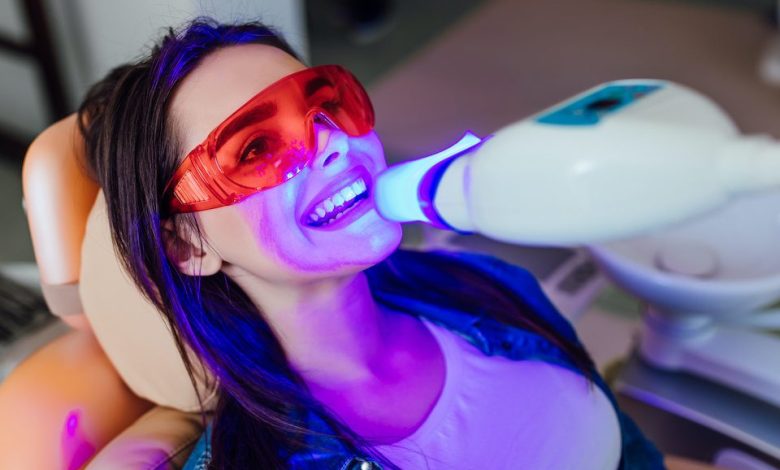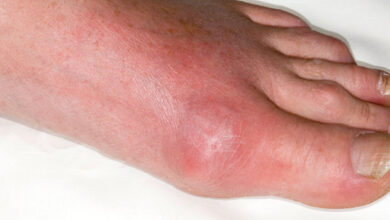Laser Teeth Whitening: Is it Worth the Risk?

In the past few years, teeth whitening has grown from a niche beauty treatment into a booming business with broad appeal across age and gender lines. According to the American Academy of Cosmetic Dentistry, demand for cosmetic procedures that involve light or lasers has increased by more than 40 percent in 2016 alone — and experts expect that growth to continue over the next few years.
In response to this demand, laser teeth whitening has emerged as one of the most affordable and accessible ways for people to achieve whiter teeth at home. However, as any beauty-savvy individual knows, there’s always a downside to every beauty treatment, and laser whitening is no exception. While it’s generally safe when performed by an experienced professional in a controlled environment, there are risks associated with laser whitening if you’re not careful about where you get it done and what products you use at home afterward.
What Is Laser Teeth Whitening?
Laser teeth whitening is a cosmetic treatment that uses high-intensity light to break down the molecules in stains on the teeth and remove them over time. The light is applied to the teeth in combination with a gel that is applied to the surrounding tissue to protect it from damage. This process is also sometimes known as photodisorption. Laser teeth whitening is a highly controlled process that only takes about an hour to complete, and the results typically last for a year or longer. In between treatments, you can maintain your whitened teeth with at-home whitening kits that use milder light sources like blue or red light.
Why People Whiten Their Teeth
Teeth whitening has a long and storied history dating back thousands of years. In ancient Egypt, people would use urine as a natural teeth whitener. In the 19th century, bicarbonate of soda was used to remove stains. And in the early 20th century, carbamide peroxide was developed as a teeth whitening agent. More recently, laser teeth whitening has become a very popular procedure. In fact, one survey found that the majority of people who wanted to whiten their teeth did so because they wanted to improve their confidence while speaking in public and in front of groups. Other common reasons included a desire to look younger and an interest in improving one’s appearance in general.
What Are the Risks of Laser Teeth Whitening?
One of the biggest risks of laser teeth whitening is the potential for sensitivity. Although most patients report no sensitivity after a laser teeth whitening procedure, it’s a risk that can’t be entirely ruled out. Another risk associated with laser teeth whitening is tooth discoloration. While most dentists will perform a teeth whitening procedure meticulously, it’s still possible to end up with a discolored tooth here and there.
The Dangers of DIY Whitening Kits
DIY whitening kits are very inexpensive and easy to obtain, but there’s a reason for that. The vast majority of over-the-counter whitening kits use carbamide peroxide to break down the molecules in teeth stains and remove them. This is an effective product, but it’s also extremely strong and can lead to serious injuries and burns if used incorrectly. One of the biggest dangers of using a DIY whitening kit is tooth sensitivity. As we’ve discussed, most people experience no sensitivity after a teeth whitening procedure, but DIY whitening kits can cause teeth sensitivity. Another danger of DIY whitening kits is that they can discolor teeth. While most professionals will take great care to prevent this from happening, it can happen and should be taken seriously.
The Dangers of Professional Whitening Tools
Professional teeth whitening tools use a laser to break down the molecules in stains on teeth and remove them over time. This is a very effective procedure and can lead to significant whitening if performed correctly, but it’s also a very intense procedure that may lead to serious injuries and burns if used incorrectly. One of the biggest dangers of professional teeth whitening tools is tooth sensitivity. As we’ve discussed, most people experience no sensitivity after a teeth whitening procedure, but professional teeth whitening can cause teeth sensitivity. Another danger of professional teeth whitening tools is that they can discolor teeth. While most professionals will take great care to prevent this from happening, it can happen and should be taken seriously.
Conclusion
Laser teeth whitening is a cosmetic procedure that uses high-intensity light to break down the molecules in stains on the teeth and remove them over time. It’s a highly controlled process that only takes about an hour to complete and can lead to significant whitening if performed correctly. The biggest risks associated with laser teeth whitening are potential for sensitivity and tooth discoloration. Anyone interested in laser teeth whitening should make sure they visit a dentist or other professional to perform the procedure and use protective gear like a lip balm and a mouth guard to shield their lips and teeth from damage.




